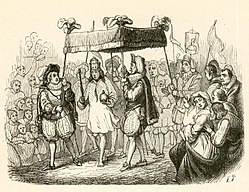
Back ملابس الإمبراطور الجديدة Arabic Новите дрехи на краля Bulgarian El vestit nou de l'emperador Catalan Císařovy nové šaty Czech Dillad Newydd yr Ymerawdwr Welsh Kejserens nye klæder Danish Des Kaisers neue Kleider German La novaj vestoj de la Imperiestro Esperanto El traje nuevo del emperador Spanish Kuninga uued rõivad Estonian
| "The Emperor's New Clothes" | |||
|---|---|---|---|
| Short story by Hans Christian Andersen | |||
 Illustration by Vilhelm Pedersen, Andersen's first illustrator | |||
| Original title | Kejserens nye klæder | ||
| Country | Denmark | ||
| Language | Danish | ||
| Genre(s) | Literary folktale | ||
| Publication | |||
| Published in | Fairy Tales Told for Children. First Collection. Third Booklet. 1837. (Eventyr, fortalte for Børn. Første Samling. Tredie Hefte. 1837.) | ||
| Publication type | Fairy tale collection | ||
| Publisher | C.A. Reitzel | ||
| Publication date | 7 April 1837 | ||
| Chronology | |||
| |||
| Part of the Politics series |
| Republicanism |
|---|
|
|
"The Emperor's New Clothes" (Danish: Kejserens nye klæder [ˈkʰɑjsɐns ˈnyˀə ˈkʰlɛːðə]) is a literary folktale written by the Danish author Hans Christian Andersen, about a vain emperor who gets exposed before his subjects. The tale has been translated into over 100 languages.[1]
"The Emperor's New Clothes" was first published with "The Little Mermaid" in Copenhagen, Denmark, by C. A. Reitzel, on 7 April 1837, as the third and final installment of Andersen's Fairy Tales Told for Children and has since been adapted to various media. The tale serves to illustrate the concept of gaslighting and the folly of authoritarianism[2], while the story's title, the phrase "the Emperor has no clothes", and variations thereof have been adopted for use in numerous other works and as idioms.

- ^ Andersen 2005a 4
- ^ "Something widely accepted as true or professed as being praiseworthy due to an unwillingness of the general population to criticize it or be seen as going against popular opinion." http://idioms.thefreedictionary.com/the+emperor's+new+clothes